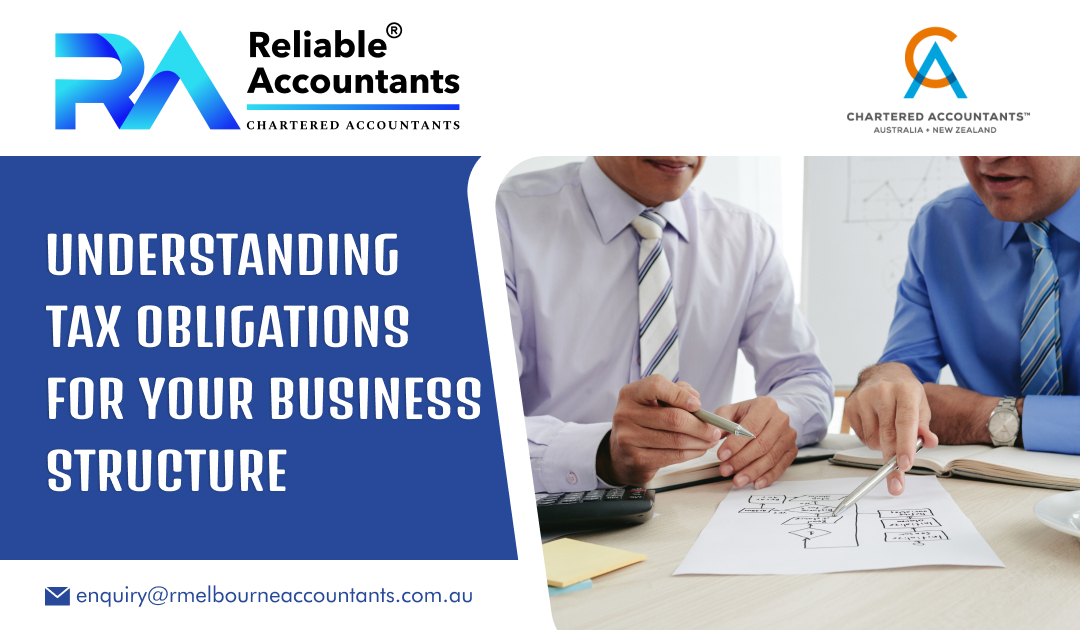When starting a new business, you must know about your tax obligations. Meeting tax obligations is crucial to avoid unnecessary penalties or fines from the ATO. If you are unaware of tax obligations for your business in Melbourne, you can reach out to small business accountants in Melbourne. In this blog, you’ll come to know about key tax obligations for a partnership, sole trader, and company. Let’s get started:
What are the different types of business structures?
Basically, a business structure:
- Defines who runs a business
- Affects your registration and tax requirements, and
- Affects your legal liabilities.
Here are the most commonly used business structures in Australia:
- Sole trader
- Partnership
If you are not sure about which business structures to choose, you can speak to registered tax accountants near your area by searching ‘tax accountants near me’.
Sole Trader
As a sole trader, you:
- Use your individual TFN when filing a tax return.
- Declare all your income in your individual tax return, using the section for showing business items to demonstrate your business expenses and revenue.
- Are eligible for an Australian Business Number and use that ABN for all business activities.
- Must register for GST if:
- Your annual GST turnover is $75,000 or above.
- You offer limousine, taxi, or ride-sourcing services.
- You want to apply for the claim for fuel tax credits.
- May be liable to claim a deduction for making any personal super contributions after notifying your fund. To claim any deductions, you must have an accurate record as evidence, and for this, you can get bookkeeper service.
- May have to file business activity statements, for instance, if you are registered for Goods and Service Tax or have employer obligations.
- Pay tax on all your income, including revenue from your business depending on your individual tax rate.
- May be required to make PAYG instalments to pre-pay your income tax.
Partnership
A partnership is a group of people who operate a business together and share the losses and profits from the business between themselves. Often, they must involve the best tax accountant for tax purposes. If you are running a business in a partnership and need a tax accountant near your area, you can consider searching for the ‘best tax accountant near me’. In the absence of a written agreement, profits and losses are divided equally between partners. The partners in a partnership are not considered employees, but they have the authority to hire other workers. Each partner is responsible for their own superannuation, while the partnership must pay superannuation for its employees.
A key tax obligation for a partnership where partnership:
- has its own TFN
- must file an annual partnership return showing all business revenue and deductions and how its profits or losses are divided among the partners
- must apply for an ABN and use it for all business activities
- need to register for GST if it:
- has an annual GST turnover of $75,000 or above
- offers limousine, taxi, or ride-sourcing services
- wants to claim fuel tax credits
Company
A company is a separate legal entity, owned by shareholders and run by directors, with its own tax and superannuation obligations. It can distribute profits through dividends, potentially with franking credits. Directors may be liable for certain company debts under director penalty rules. Companies must register for a director identification number and comply with Australian Securities and Investments Commission (ASIC) regulations. They have higher setup and administration costs and more reporting requirements. A company:
- Must manage their tax and superannuation obligations, and they can also seek help from a tax return accountant.
- They need to apply for its TFN.
- They are liable to an ABN.
- They must register for GST if their annual turnover is $75,000 or above, offer ride-sourcing services, and want to claim fuel tax credits.
- They must file BAS.
- Must file tax returns.
- They have to pay a super guarantee for any eligible employees.
Conclusion
You need to meet tax obligations according to your business structure. For more information about your tax obligations, you can speak to Reliable Melbourne Accountants.

